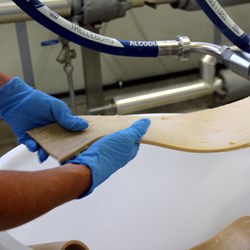


Food companies face complex challenges when developing vegan products. These range from taste through health to the texture of the product. Nor should the production process be overlooked.

© Food Pilot
Creating plant-based alternative products with sensory appeal and a good health profile requires expertise in product development. The taste of vegetable and animal and milk proteins cannot be compared. Plant proteins have a different composition from meat proteins and can also lend an undesirable product flavour. Furthermore, most plant proteins other than soya lack one or more essential amino acids. One solution is to combine several types of vegetable protein, but then the risk of allergies increases. Alternative plant products lack iron, selenium and zinc as well as vitamins B12 and D, all of which are sufficiently present in meat.
Nor can anti-nutritional factors, such as trypsin inhibitors and lectins, be ignored. These have an adverse effect on the digestion and on the absorption of the food. Allergens and anti-nutritional factors can be reduced by heating.
Functional properties
An essential precondition when replacing animal protein with plant protein is the maintenance of its functional properties. Structure is an Achilles heel for most meat substitutes. Meat proteins cannot be replaced on a one-to-one basis.

© Food Pilot
Technological challenges
The challenge when manufacturing vegan products is to translate knowledge of the functions of plant ingredients into optimal process parameters for the entire production process: from raw material to finished product. This requires no more than application know-how. Extrusion processes are used for the production of plant-based meat substitutes. A recent Danish technological development has made it possible to imitate muscle tissue, using plant fibres, proteins, fats and water. Low thermal and mechanical energy transform the plant proteins into a three-dimensional open fibre structure.
Collaboration
Further development of vegan products requires close collaboration between food companies, suppliers of ingredients, and technology and knowledge institutions. The vegan market is growing very fast. What's important is to create a win-win situation, where everyone benefits.

“It is always advisable to maintain a critical perspective on your own products and adjust them to contemporary needs where necessary”, emphasises Marijke Adriaens, CEO of frozen food company Fribona. “For consumers, taste is still the main consideration. It is essential to work towards a product that is, above all, tasty and visually appealing.”...

Scientists from KU Leuven have discovered how oil penetrates snacks during and after the frying process. Recent research findings point to advanced frying techniques that reduce oil absorption, as well as innovative methods to limit oil uptake during the cooling phase. This paves the way for the development of healthier snacks without compromising...

Food companies are increasingly targeting a wider range of consumer groups. Speaking at an event organised by Fenavian, Julian Mellentin of New Nutrition Business said this strategy offers significant opportunities to respond to the diverse health needs and interests of today’s consumers. “Consumers enjoy both animal and plant-based proteins”, he...

Backed by financial partners, Start it @KBC is launching the accelerator programme Scale it Agro, aimed at scale-ups offering sustainable and innovative agricultural solutions for agriculture and horticulture businesses. Kjell Clarysse, programme director at Scale it Agro, goes into more detail.